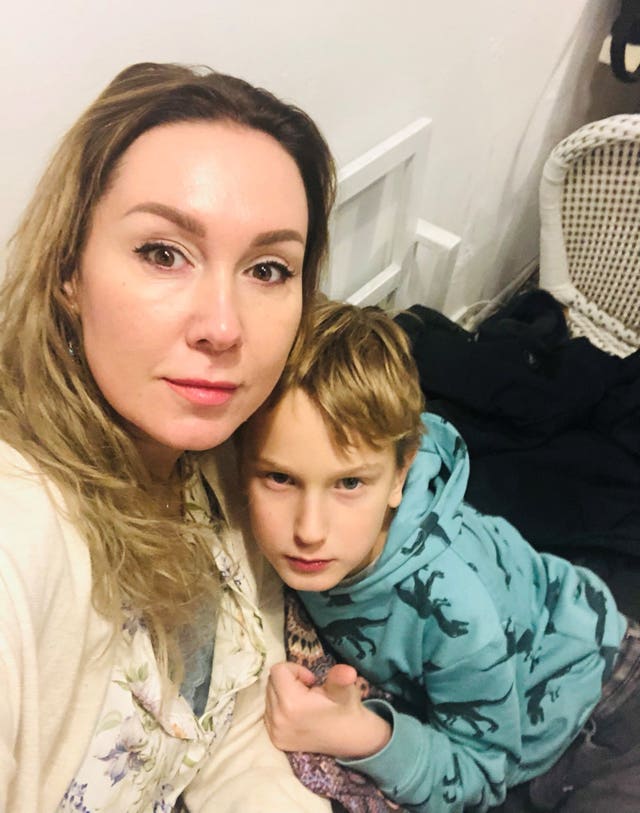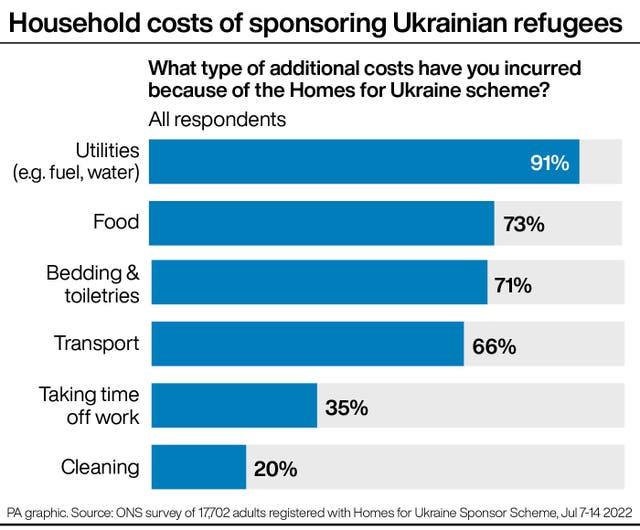A Ukrainian refugee settled with a host in the UK has said she wakes up every day worrying about her young son being retraumatised if they are forced to relocate away from their community.
Tania Orlova came to the UK in April with her son Danylo, eight, and 74-year-old mother Liubov under the Homes for Ukraine scheme.
They are being hosted by a family-of-three in High Wycombe, in Buckinghamshire, who have agreed they can stay for between nine and 10 months.
Ms Orlova said their hosts are “so helpful and supporting”, but it is “absolutely natural” that they will want their space back at some point, while it will also be more comfortable for her family to have their own home.
The 44-year-old from Kyiv has started looking for rental accommodation on the Rightmove and Zoopla websites but said her lack of credit history in the UK was causing problems, while properties in the area she had settled in are “expensive”.
She told the PA news agency: “Now we have come to UK, it’s really so welcoming and nice.
“At the same time I feel like we are in this Cinderella fairytale when we’ve got everything nice – nice dress, we are in this nice place, with a nice carriage – but then there is a certain time when our carriage would turn to be a pumpkin.”
Ms Orlova has a job working at a local charity, her son is settled in school and the family is registered with a GP.
She said: “And now – what if I can’t find an apartment in Buckinghamshire, which is an expensive county?
“What if I have to move, what if I have to move from High Wycombe, where I am now, to another place, so I have to traumatise my kid again to move again?
She added: “You wake up and you think about it. What, what could I do? What could I do next? What could be my next step?”

Wednesday marks six months since the start of the war in Ukraine.
Around 81,700 refugees have come to the UK under the Homes For Ukraine scheme, with hosts expected to provide accommodation for at least six months.
Refugees whose placements are set to end will need to find alternative accommodation either independently or with another sponsor.
Research from the Office for National Statistics (ONS) found that the rising cost of living and lack of affordability was cited by 23% of hosts who do not want the arrangement to continue beyond six months.
Councils fear that homelessness could rise, with local government figures showing at least 1,300 Ukrainian refugee households had become homeless or been threatened with homelessness as of July 29.
Our Ukrainian friends also have an open letter to the government.Please spread the word and sign it herehttps://t.co/LLS3iIasdT pic.twitter.com/A4S0c9KJbJ
— krish kandiah (@krishk) August 19, 2022
Ms Orlova has helped to organise an open letter to the Government from refugees, with suggestions to help them find settled accommodation.
The letter, co-ordinated with the Sanctuary Foundation, says refugees are experiencing “serious impediments” when it comes to trying to rent, and this is “beyond the reach” of many who are currently being sponsored.
The suggestions include enabling families to rent homes together, and ensuring they have access to intensive English language courses, which would enable them to start earning sooner.
Other proposals include creating a database of landlords that are ready to rent property to Ukrainians and providing financial incentives, potentially in the form of property taxation allowances.
A spokeswoman for Buckinghamshire Council said it will be challenging to find accommodation in some locations “due to a lack of availability and high housing costs”.
She said: “We want to help our guests from the Ukraine as much as we can and are looking at solutions which will require all tiers of government, the private and voluntary sector to work together.”

This includes extending stays with existing sponsors, rematching with new sponsors, renting privately – where the council may be able to help with a deposit guarantee and provide one month’s rent upfront – and applying for social housing, although high demand means there is likely to be a long wait.
Kateryna, a mother-of-two, has been living with hosts in Wysall, a village near Nottingham, since early May.
Her son, 14, and four-year-old daughter have both started at local schools.
Their sponsors have helped the family “a lot” but are unable to host them beyond early November due to pre-existing commitments.
Kateryna said they are struggling to find another sponsor who lives near to the children’s schools, and who can provide support while she continues with her English lessons.
She told PA: “Three weeks ago we turned to the council, but there is no concrete answer at the moment.
“I am very worried about the unknown. I want stability, certainty. I want a better future for my children.
“I am determined to work for the future of my children.”
A Department for Levelling Up, Housing and Communities spokeswoman said the majority of sponsors want to continue for more than six months, adding: “We are contacting sponsors and Ukrainians directly to outline next steps and the support available to them.”
They did not set out, when asked, what these steps and support are, or whether the department has already begun to contact people.




Comments: Our rules
We want our comments to be a lively and valuable part of our community - a place where readers can debate and engage with the most important local issues. The ability to comment on our stories is a privilege, not a right, however, and that privilege may be withdrawn if it is abused or misused.
Please report any comments that break our rules.
Read the rules here